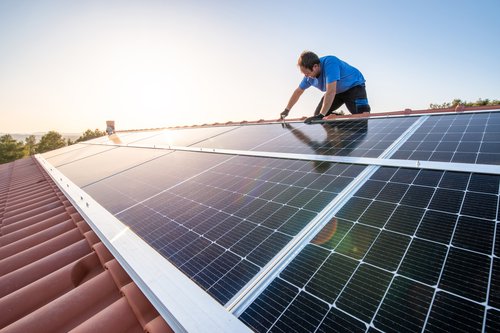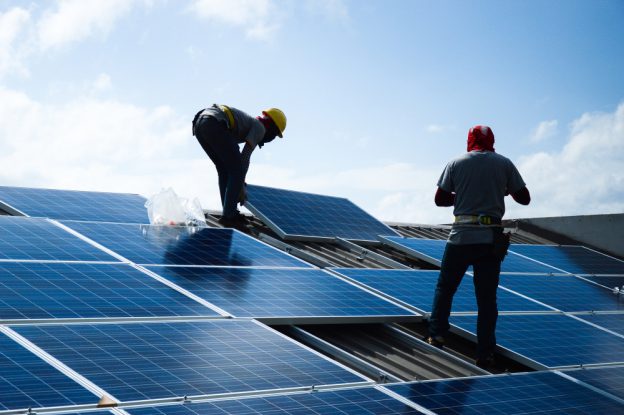Just How to Select the Right Solar Energy Installment for Your Energy Requirements
Choosing an ideal solar power setup requires a methodical method that begins with a clear understanding of your power consumption patterns and anticipated future demands. Aspects such as the kind of solar technology, installation costs, and available incentives play essential functions in making a notified choice.
Assess Your Power Needs
Analyzing your power requires is a vital primary step in the solar energy installation procedure. Understanding your current and future energy intake will lead the style of an effective planetary system tailored to your demands. Begin by analyzing your utility expenses from the previous year to establish your ordinary monthly power usage, typically gauged in kilowatt-hours (kWh) This data will offer a structure for computing the dimension of the solar system you might need.
Consider seasonal variations in energy intake, as specific months might demand even more power due to heating or cooling demands. In addition, review any type of organized modifications in way of living or home, such as the acquisition of electrical vehicles or home developments, which may boost your energy needs in the future.
Once you have a detailed understanding of your power consumption, you can figure out the appropriate solar capability required to fulfill those needs. This evaluation not just helps in sizing the solar installment but likewise informs choices about energy storage space remedies and potential grid link needs. solar photovoltaic. Ultimately, precisely assessing your energy requires ensures that your solar power system operates effectively, providing the advantages of renewable resource in placement with your intake patterns

Evaluate Solar Modern Technology Options
When thinking about a solar power installment, it is important to evaluate the different solar technology alternatives offered to make sure the system straightens with your energy demands and budget. The key innovations consist of monocrystalline, polycrystalline, and thin-film solar panels, each offering unique advantages and downsides.
Monocrystalline panels are understood for their high performance and performance in restricted room, making them appropriate for household setups with much less roof area. Nevertheless, they often tend to be much more pricey. Polycrystalline panels, while somewhat much less efficient, are normally extra cost effective and can be a good choice for larger installments where room is not a constraint. Thin-film photovoltaic panels are light-weight and versatile, optimal for unusual surfaces, however they normally have reduced efficiency and call for even more space to produce the exact same power output.
In enhancement to panel kinds, take into consideration solar inverters, which transform the straight present produced by the panels right into alternating existing for home usage. String inverters, microinverters, and power optimizers each have one-of-a-kind advantages that can influence system efficiency. Examining these choices will certainly aid you make an enlightened decision that meets your energy requirements successfully.
Think About Setup Costs
Understanding setup expenses is essential for anyone considering a solar energy system. These prices can vary considerably based on numerous variables, consisting of system size, sort of panels, and installment intricacy. A common residential solar installment might range from $15,000 to $30,000 prior to motivations, which can be a considerable in advance financial investment.
To properly evaluate installation prices, it is important to obtain thorough quotes from several solar companies. These quotes ought to break you can try this out down the prices of devices, labor, permits, and any type of additional devices required for the installation. Pay very close attention to the high quality of materials being used, as higher-quality panels and inverters can result in much better performance and longevity, possibly offsetting greater initial expenses.
Furthermore, consider the lasting implications of installment costs. A less costly installment could save money ahead of time but might lead to higher maintenance expenses or lowered energy production with time. It is likewise recommended to review financing choices, such as solar loans or leases, which can impact your general financial dedication.
Research Citizen Motivations
Discovering local incentives can dramatically affect the general expense of a solar power setup. Several areas provide a variety of economic rewards focused on promoting eco-friendly energy usage, making solar energy much more available and budget-friendly for property owners and companies alike.
These incentives may consist of federal tax credit scores, state discounts, and regional energy firm programs that supply cash money rewards or net metering alternatives. The Federal Financial Investment Tax Credit (ITC) enables you to subtract a considerable portion of your solar installation expenses from your government taxes. State-specific rewards can further improve these cost savings, often in the type of straight cash refunds or tax next page obligation credit histories.
Furthermore, some city governments might provide real estate tax exemptions for solar installments, making sure that your financial investment does not increase your residential property tax obligation liability. Investigating these rewards can uncover substantial cost savings, which can influence your choice on the dimension and kind of solar system to set up.

Pick a Credible Installer
Picking a trusted installer is important to making certain the success and long life of your solar power system. The installation procedure considerably impacts the performance and efficiency of your photovoltaic panels, making it important to pick a professional with a tested performance history. Begin by investigating neighborhood installers through on-line reviews and endorsements. Web sites such as the Better Business Bureau can give understanding into consumer fulfillment and service reliability.
Next, verify the installer's qualifications, including licenses, qualifications, and insurance coverage. A credible installer ought to hold accreditations from identified companies, such as the North American Board of Qualified Energy Experts (NABCEP), indicating a high degree of know-how. In addition, ask about the installer's experience with similar tasks, specifically in your area, as regional climate and regulations can affect setup practices.
Request multiple quotes and compare them not just on price however additionally on the high quality of equipment and service warranties supplied. A credible installer must give transparent information regarding their items and solutions, assisting you make an educated decision. By investing time in selecting a reputable installer, you will enhance the overall performance and resilience of your solar energy system.
Final Thought
Finally, choosing the suitable solar energy installment requires a complete examination of energy requirements, an understanding of available solar innovations, and a careful factor to consider of setup costs. Investigating local motivations can improve economic benefits, while selecting a reputable installer ensures quality handiwork and reliability. solar photovoltaic. By systematically evaluating these browse around these guys factors, individuals can accomplish an ideal solar option that fulfills both existing and future power demands, eventually adding to lasting power practices and price savings in time